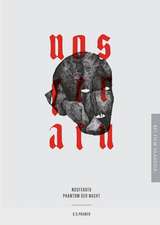Pedro Almodovar: World Directors
Autor Ernesto R. Acevedo-Munozen Limba Engleză Paperback – 11 apr 2007
| Toate formatele și edițiile | Preț | Express |
|---|---|---|
| Paperback (1) | 199.83 lei 3-5 săpt. | |
| British Film Institute – 11 apr 2007 | 199.83 lei 3-5 săpt. | |
| Hardback (1) | 569.70 lei 3-5 săpt. | |
| British Film Institute – 24 feb 2004 | 569.70 lei 3-5 săpt. |
Preț: 199.83 lei
Nou
Puncte Express: 300
Preț estimativ în valută:
38.24€ • 41.53$ • 32.12£
38.24€ • 41.53$ • 32.12£
Carte disponibilă
Livrare economică 02-16 aprilie
Preluare comenzi: 021 569.72.76
Specificații
ISBN-13: 9781844571505
ISBN-10: 1844571505
Pagini: 322
Ilustrații: illustrated
Dimensiuni: 155 x 235 x 22 mm
Greutate: 0.45 kg
Ediția:2004
Editura: British Film Institute
Colecția British Film Institute
Seria World Directors
Locul publicării:London, United Kingdom
ISBN-10: 1844571505
Pagini: 322
Ilustrații: illustrated
Dimensiuni: 155 x 235 x 22 mm
Greutate: 0.45 kg
Ediția:2004
Editura: British Film Institute
Colecția British Film Institute
Seria World Directors
Locul publicării:London, United Kingdom
Cuprins
Introduction:
Almodovar's
cinema
in
context.-
Chapter
one:
The
aesthetics
of
bad
taste.-
Chapter
two:
Memory,
identity,
and
style.-
Chapter
three:
Figures
of
desire:
the
melodrama
of
longing.-
Chapter
four:
The
body
and
the
nation.-
Conclusion:
Bad
bodies,
good
hearts.
Notă biografică
Ernesto
R.
Acevedo-Munoz
is
Associate
Professor
of
Film
Studies,
Comparative
Literature
&
Humanities,
University
of
Colorado,
Boulder.
Textul de pe ultima copertă
The
book
provides
a
detailed
introduction
to
the
essential
themes,
style,
and
aesthetics
of
Pedro
Almodovar's
films,
put
in
the
context
of
Spain's
profound
cultural
transitions
since
1980.
With
precise
and
close
analysis,
the
book
covers
the
major
concerns
of
the
most
successful
of
all
Spanish
film
directors
and
makes
direct,
clear
connections
to
the
logic
of
Almodovar's
aesthetic
and
stylistic
choices.
By
spanning
the
entirety
of
Pedro
Almodovar's
feature
making
career,
the
book
emphasizes
the
director's
sensibility
to
make
the
outrageous
believable
and
to
always
give
a
unique
spin
to
the
issues
Spanish
history,
culture
and
identity.
A
detailed
and
comprehensive
approach
to
all
of
Pedro
Almodovar's
feature
films
from
the
outrageous
1980
"Pepi,
Luci,
Bom
and
Other
Girls
on
the
Heap"
to
the
sophisticated
2004
"Bad
Education",
this
book
provides
more
than
an
introduction
an
intimate
look
at
the
topics,
style,
aesthetics
and
cultural
sensibilities
of
Spain's
most
distinguished
and
celebrated
film
director
since
Luis
Bunuel.
By
focusing
on
a
film-by-film,
and
often
scene-by-scene
analysis,
this
book
offers
a
meticulous
interpretation
of
characters,
situations,
allusions
and
cultural
intersections,
as
well
as
emphasizing
the
meaning
and
weight
of
cultural,
historical
and
social
contexts.
The
book
traces
the
evolution
of
Almodovar's
career,
from
the
perspective
of
aesthetic,
narrative
and
stylistic
concerns
and
places
those
changes
in
the
logical
context
of
Spain's
historical
trajectory
from
the
end
of
Franco's
dictatorship
to
the
transition
to
democracy,
exploring
Almodovar's
interest
on
issues
of
identity,
sexuality,
and
nationalism.


























